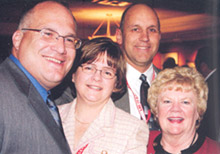 |
Home | Search | Browse | About IPO | Staff | Links |
 |
Home | Search | Browse | About IPO | Staff | Links |
|
GET ON BOARD If You Don't Care About Politicians, They Won't Care About You  Dr. Ted Flickinger IAPD President and Chief Executive Officer Out of ignorance we can foster the twofold myth that: (1) politics is an unethical profession; and (2) involvement in politics is unnecessary. Nothing could be further from the truth. As concerned citizens and professionals, we have the right and the responsibility to participate in the political process. Yet, there are people who continue to say, "Why bother?" Why Participate in Politics Our political system sets public policies and priorities that affect us all. But they don't do so in a vacuum. So if you are not at the table, some other organization or group will get your share of the financial pie. Like anybody else, you have a right to be heard by politicians and to lobby for your interests. If you choose not to use this right, then you must accept the decisions that politicians make on your behalf. Politics is the motivating force of democracy. Politics is far too important to be left to the politicians. We will achieve our collective goals not by shunning political action, but by learning and doing politics. By expressing your views through lobbying, you are exercising the First Amendment to the U.S. Constitution, which affirms "the right of the people...to petition the government for a redress of grievances." That right has protected and nurtured lobbying. Lobbying Is a Service Lobbying is not angling for your legislator's vote on a specific question. Effective lobbying is really relationship building. These are relationships that good lawmakers welcome. As government becomes larger and legislation more technical and far reaching, legislators increasingly rely on information offered by those who have expertise on the subject contained in the proposed legislation. When legislation pertains to parks, recreation or conservation issues, you are the expert. If you find agreeable ways to let your legislator know that you are willing and able to share your knowledge, then your ongoing relationship with your legislator becomes mutually beneficial. "Politics is far too important to be left to the politicians." Build the Relationship Work with your legislators to advance the needs of your agency. Work at keeping in touch with your legislator. Speak with a forceful and united voice on issues confronting your agency today. Accept your legislators as professionals. Accept them as decision-makers who have a tremendous bearing on your life. Learn to work with them and to respect their philosophies and goals. Today, as never before, interest groups are advocating through their lobbyists their posture on issues and their needs. Without an organized, effective, identified and vocal public interest group, your absence won't be noticed. You'll be overlooked and just plain forgotten. The parks, recreation and conservation movement can't afford that outcome. Problems will be addressed when we brand our identity  Attend the IAPD Legislative Conference to learn more about what you can do to help the citizens of your community and your agency by promoting the IAPD legislative platform. and increase our determination to affect the political system. We must raise, not lower, our expectations. We must speak out and speak up for parks, recreation and conservation. We can create our own future. How will you help? March 2007/Illinois Parks/6 DOs and DON'Ts for Your Lobbying Efforts You can make a difference. Here are a few do's and don'ts when working with your state and national legislators. DON'Ts 1. Don't promise anything you cannot deliver. Your word is your bond. 2. Don't lie or mislead a legislator about the relative importance of an issue, the opposition's position or other matters. 3. Don't assume that your opinion will not matter on a piece of legislation. Lawmakers need your input. Never forget that your constituents are also their constituents. To be an effective lobbyist for your agency, you need open lines of communication with your lawmakers (and not just when you want something). 4. Don't cut off anybody from contact. Do not let a legislator consider you a bitter enemy because you disagree; today's opponent may be tomorrow's ally. 5. Don't use incomplete, outdated or simply inaccurate information when presenting your case. If your lawmakers do not believe your information is credible, your pleas will fall on deaf ears. 6. Don't threaten your lawmakers, either implicitly or explicitly. You do not like to be threatened. Neither do they. Never imply public reprisals from "back home" if a lawmaker does not support your position. No tactic can permanently close lines of communication faster. Your legislator might not be a supporter on one issue, but could support you on other issues. 7. Don't get mad. When you are crossed politically, don't get mad. Get even. The power of the ballot box is yours. 8. Don't gossip. Knowing legislators' peculiarities is one thing; talking about them is another. 9. Don't grab credit. Nothing is impossible if it does not matter who gets the credit. Recognize legislators for their assistance. DOs: 1. Know your facts; express them accurately and positively. Facts and figures matter; so do sources. 2. Know your opposition. Identify your opposition early. But never purposefully misrepresent your opponent's view. That damages your credibility, and long-term credibility is more valuable than short-term gain; it helps you win the war even though you may lose the first few battles. Instead, honestly analyze your opponent's position and attempt to neutralize it. This analysis is as important as your own case. Carefully prepare rebuttals to your opponent's view. 3. Make certain you communicate a unified position. If your lawmaker has reason to believe that your position does not represent a unified position within your community or district, your efforts will carry little weight. Convince your lawmakers your position has the support of constituents back home. Attend lAPD's Legislative Conference on May 2 There are many more suggestions on how to influence the political process. Plan now to attend the May 2 IAPD Legislative Conference in Springfield to learn more about what you can do to support the IAPD legislative platform and advocate for parks, recreation and conservation. Your agency can also participate in Parks Day at the Capitol on May 1. Your display in the Capitol Rotunda reminds lawmakers, legislative staff and Capitol visitors how your agency adds to the quality and economic vitality of your community. To participate, contact IAPD Public Relations Manager Bobbie Jo Hill at the IAPD office at 217-523-4554 or bjhill@ILparks.org before April 5. As a side trip, while in Springfield visit the world-renowned Abraham Lincoln Presidential Library and Museum. You will be glad that you did. March 2007/Illinois Parks/7 |
|
|